
Review "Адкрытае грамадства"
review of: Socio-analytical magazine "Адкрытае грамадства" Nr.1, vol.12, 2002
More...We kindly inform you that, as long as the subject affiliation of our 300.000+ articles is in progress, you might get unsufficient or no results on your third level or second level search. In this case, please broaden your search criteria.

review of: Socio-analytical magazine "Адкрытае грамадства" Nr.1, vol.12, 2002
More...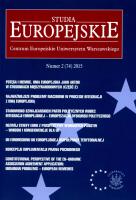
The political importance of the EU–Ukraine association agreement – to say its vital existential role for the future of Ukraine and the dramatic event surrounding its conclusion overshadowed the pure legal aspects of its implementation. However, the commencement of its provisional ap¬plication brings legal aspects to the front. At the current state, there is a gap between the Ukrainian constitutional order and the ultimate obliga¬tion of Ukraine to implement the binding decision of the supranational institutions established under the Agreement (Association Council and Committee). The successful experience of the countries of Central and Eastern Eu¬rope, which had the similar problems, shows possible solutions to the problem. Particularly, in Slovakia and Poland it was a constitutional re¬form with the introduction to the Constitution of separate articles legitimizing the status of documents, adopted by international organization, certainly including the Association Agreement institutions and later the European Union itself. This development created important legal prerequisites for further European integration of the countries, which ended up with full-scale EU membership. Moreover, the general trend of consolidating the principles of suprem¬acy and direct applicability of the EU law at the level of national constitutional acts of member-states reflects the specific features of the EU law application as well as its inter-connection and interdependence with the national legal systems. Therefore at the level of its constitution Ukraine has to accept the specific role of the EU law as a sui generis legal system. At the current stage the focus is certainly on the implementation of the Association institutions’ decisions, however, in a longer perspective there is a distinct need for the constitutional consolidation of principles governing the inter-relations of the EU law and national law of the member-states i.e. the principles of direct applicability and the supremacy. It is necessary to emphasize that despite the fact that EU law is not binding for Ukraine at this moment, it is important to use it at least as the 60 Ibidem. M. Oleksandr, S. Volodymyr, Constitutional Perspective... interpretive tool for the application of the national legislation due to the legislatively set goal of European integration. In this way the Ukrainian legal system will get rid of the limits, preventing it from exposition to the EU legal system, contributing to its independent development towards the standards already existing in the European Union. From this perspective the overcome of the mentioned constitutional gap is of critical importance for the creation of adequate procedures of the practical implementation of the Association Agreement.
More...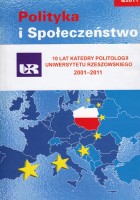

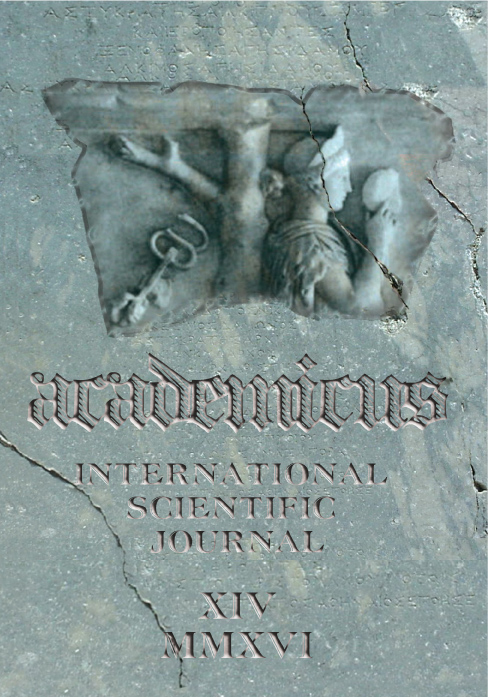
The topic of this comparative study is the republican character of the system of governance in Kosovo. In the public discourse and political communication, as well as in academic discourse Kosovo is considered a Parliamentary Republic, based on the principle “of the separation of powers and checks and balances between them.” Although the constitutional definition of the relationship between the executive and legislative favors parliamentary republicanism, the constitutional powers of the president, the government and especially the constitutional and political power of the prime minister, significantly weaken the parliamentary character, in favor of a semi-presidential system. However, neither the current theories of government, nor constitutional provisions can rank Kosovo among semi-presidential systems, or pure parliamentary systems. Comparisons of competence powers relations in Kosovo, with similar relations and competences of the countries of the region and beyond, testify to the specific nature of parliamentary democracy in Kosovo. It is precisely the comparison of the Kosovo constitutional-legal system of governance with similar systems and theoretical analysis of parliamentary models facing Kosovo model which will be the basis of support of the hypothesis that Kosovo is not a typical parliamentary republic.
More...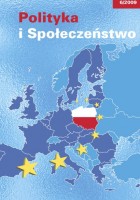


This article raises the question regarding the position and role of councillors in the system of self-government in England. It analyses the reforms implemented first by the Labour Party government under the banner of democratization and modernization of local government (1997-2010) and then by the coalition government under the banner of localism (2010-2015), highlighting how this affected the position of councillors. It analyses whether and how ideas of localism contributed to strengthening the position of councillors and changed their roles. It discusses issues related to the representativeness of councillors and local democracy, and outlines the barriers to councillors’ participation in local politics. The analysis involves tasks performed by councillors, as well as an overview of their competencies. The paper presents data showing to what degree the goal of reforms has been achieved and identifies problems still faced by councillors resulting from the policies of successive governments.
More...
The introduction of regional elections to various European countries and the growth of regional authorities have recently resulted in numerous regional coalition studies, as well as the evolution of coalition formation theory. The aim of this article is to investigate the impact of coalition formation on the distribution of cabinet positions in Polish regional governments and define whether they confirm ‘office-seeking’ assumptions or if they are affected by the communist heritage and/or the existence of multi-level government. Data from 1998 to 2014 indicate an evolution towards congruent coalitions and the avoidance of cross-cutting coalitions. The 2007 national election presented a turning point. The then existing coalitions were reformulated to be strictly subordinate to a multi-level government strategy and the culmination of this approach took place in 2010, when national coalition parties (the Civic Platform (PO) and the Polish People's Party (PSL)) formed (fully or partially) congruent coalitions in all sixteen regions. The 2007 election can also be regarded as the date when the previously existing ‘regime divide’ (political cleavage between communist successor parties and parties emerging from the Communist-era opposition) determining the coalition formation became secondary, having been replaced by a new political divide. The adoption of the multi-level formation coalition strategy also made the approach of maximizing payoffs in individual regions less relevant. It became common practice to form oversized coalitions, with superfluous parties – if it was necessary to incorporate the national coalition partner. During the entire period under investigation, some parties had a lower or surplus distribution of cabinet positions in regional governments in proportion to their share of seats in regional parliaments. However, since 2007, the full-scale embrace of the multi-level strategy, introduced not by individual actors (political parties) but by coalition partners (PO and PSL), resulted in almost the complete exclusion of other political parties.
More...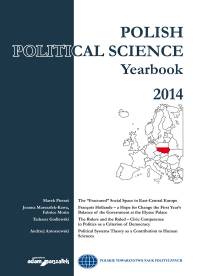
In the very first years of his presidency, François Mitterrand noticed that he will really be successful on that day when another socialist will be elected as a president of the Republic. This statement seemed to be prophetic with the victory of François Hollande, which took place 24 years after the victory of François Mitterrand and – after the sequential defeats of the Socialist Party’s candidates Lionel Jospin (in 1995 and 2002) and Ségolène Royal (in 2007) – allowed them finally to take the helm of the French government. The tension between two, yet different visions for the future of the state is so large that, according to some politicians of PS, the PSA action was not accidental. To end with, it should be noted that the answer to the difficult question of the direction of changes in the PS 12 – more to the left or toward the centre – will be possible in the autumn of 2012, when it will be resolved in a public debate a sensitive question of future pensions of the French.
More...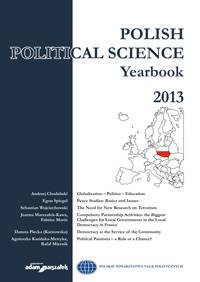
The changes in political life in Poland in the period 2005–2011, which restructured the existing balance of power (dominance of post-Solidarity parties at the expense of the post-communist party) force us to consider whether the party system evolution involves changes in the sphere of ideological divisions. But there also arises another question about the crisis of the left, which could mean the end of the previous model, intergroup rivalry. But there is no doubt that it occurred after 2005 events. Initiated processes took a completely different direction than those in the 90s. The purpose of the article is to explain the ongoing political disputes, and also attempt to answer the question: what factors shape the profile of program-ideological political formations in Poland.
More...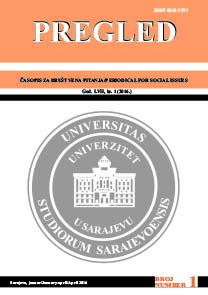
Poštovane dame i gospodo /Ladies and gentlemen, kolege i prijatelji /Friends and colleagues, profesori, istraživaĉi i dragi studenti / Dear professors, researchers, fellow students, svima koji su danas ovdje želim iskazati zahvalnost i duboko poštovanje za napor koji su poduzeli da se uključe u javno govorenje o jednoj kompleksnoj i nadasve bitnoj temi, direktno vezanoj za državu Bosnu i Hercegovinu i njezin način postojanja u internacionalnoj zajednici.
More...
O suverenitetu drţave Bosne i Hercegovine ne moţe se govoriti izvan konteksta suvereniteta uopće. To prevashodno i preliminarno podrazumijeva kratku opservaciju elementarnih teorijskih pretpostavki tretmana pojma suverenosti. Suverenost uopće je jedna izuzetno kompleksna kategorija koja je veoma ĉesto, u skladu sa zahtjevima vremena, odnosno mijenama povijesti, mijenjala svoj sadržaj i stanovišta.
More...
In this article we intend to study how the principle of administrative-territorial decentralization is applied in a comparative presentation of Romania - France - Moldova. This principle of organization and functioning of local government activity is the basis for the organization of its activity, underlying directly on the efficiency of the administrative apparatus of the administrative - territorial units.We can say that regardless of the specific form in which we find applied this principle in the administration of various countries, the administrative - territorial decentralization is a reality of the present and future society, with important implications administratively, economically and socially.
More...
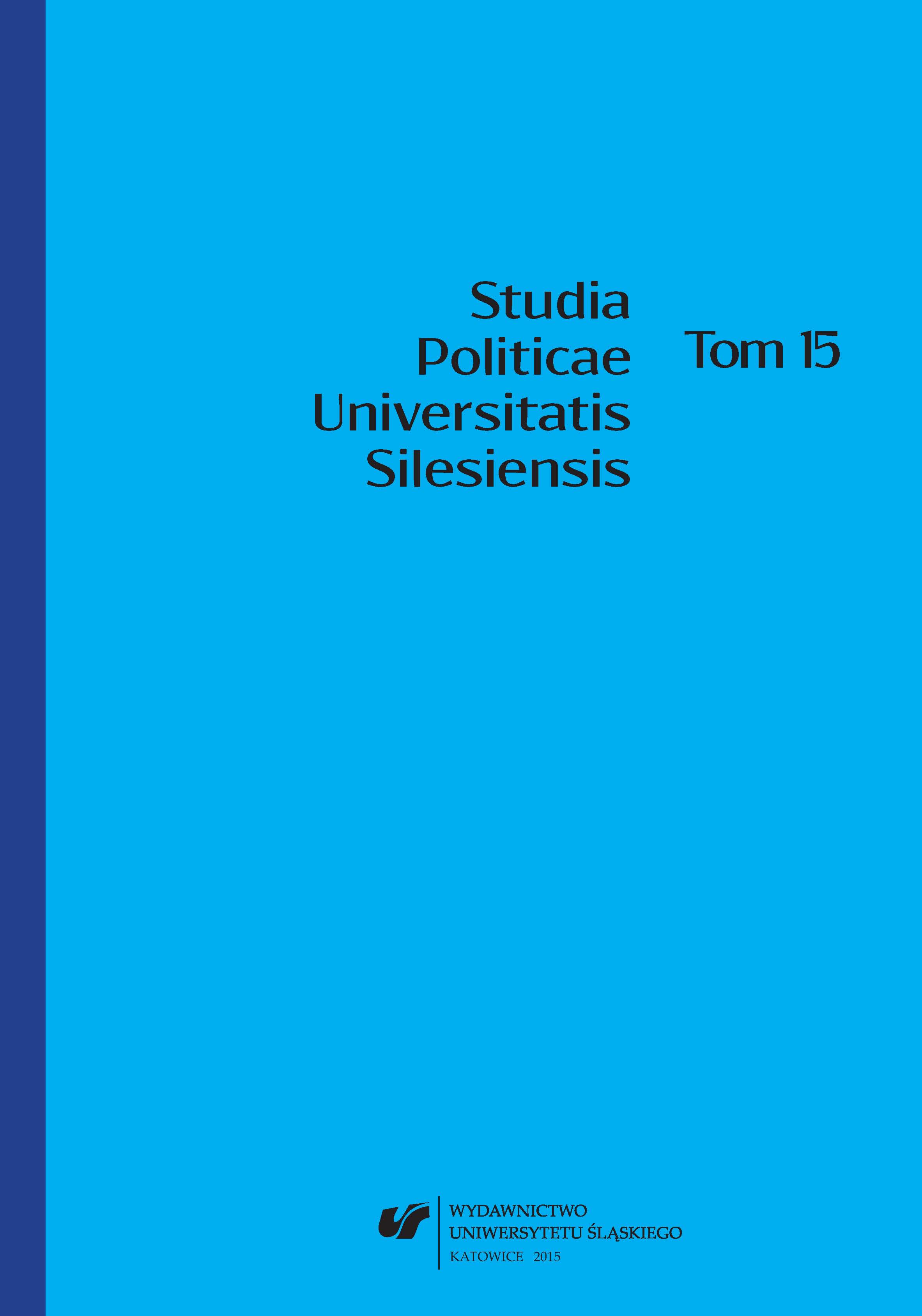
The author proposes a new concept of a political party, one which takes into account modern political groups active in local and regional communities. The stipulated definition is: a political party is a mass, distinct and formalized social group, which articulates group interests, acts based on a political program cohesive with social ideas, and achieves its aims in the execution of public authority by utilizing vertical central and territorial state institutions or relatively autonomous structures (territorial self-government, territorial autonomy, federal units). There is no need to create a separate definition of a regional and local party thanks to the proposed concept. The author does not share the position that a regional party is an ethnoregionalist party. It is submitted, that the political sciences understanding of a political party should differ from the legal view, and should not emphasize its legal status, but its functions and social roles. In this view, even trade unions, associations and even formalized groups of voters can be considered “parties”, if they actively and directly utilize public authority to achieve their group interests in the event of their election.
More...
The main theme of this article is the role of political parties in the system of representation of interests that are expressed at the national forum of political representation, which is the parliament. The said system originated without political parties, which were to emerge and show their political weightiness later on, to nowadays become an indispensable element of the political process. The latter involves both election and ruling, but also voicing of the interests, opinions, demands, and expectations of the electorate. Parties, mostly viewed critically today, at the dawn of the representative system were perceived radically different, that is, as a remedy to the aches of the said system, capable of eradicating the corruption. They were also compounded with the free (representative) mandate, which was to be another antidote to corruption as well as other pathological phenomena. It was believed that the formula where a deputy represents the general interests of the electorate is the most consistent with the form of political party. Therefore parties were designed as clearly additional and auxiliary element. Slowly but surely, however, they gained autonomy, attaining their separate and independent significance to the degree where they, as it is claimed contemporarily, reshaped the formula of the mandate, turning it form individual to collective, with political parties themselves as its owners that have become the primary subjects and agents; first of all, of the political competition, then, of the parliamentary political games. All in all, political parties seen through a prism of representation, are a kind of pendentive thereof.
More...
The article analyzes political elites of League of Polish Families (LPR). The main target is demonstration, that real power in the party had group of people concentrated around Roman Giertych, chairman of Congress of LPR and president of party, descending from environment of All‑Polish Youth. That group achieved high position in the party, could subordinate executive powers and convert them on tool of realisation its interests. The effect that activity was lack of internal democracy in LPR and deprivation of executive powers real power for the few decision circle.
More...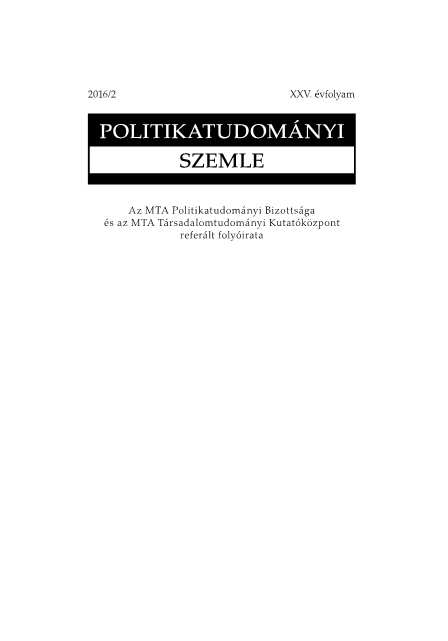
According to the starting point of the paper the problematique of the ‘crisis of reality’ occupies a central place among the causes of the growing uncertainty of radical social criticism today. One of the number one pillars of radical social criticism has been the model of appearance and reality of ideology in political theory. Accordingly appearance was an ideological concept: originally it meant those experiences, thoughts, images and senses on which the illusions of the given age are built about itself; and they played an important role in the maintenance of hegemonic and unjust social, economic and political conditions. This approach had acquired great popularity even in circles of the broader intellectuals in social sciences as well as in theories dealing with politics. Its attractiveness was due to the fact that the hopes of radical politics were also linked to intellectually mapping reality and to its strength in exposition, namely to the assumption that sooner or later the facts and processes of Reality written in capital letters would break up the rule of the ‘reality of appearance’, the common social illusion built in the name of appearance. During the past decades the attractiveness of the appearance-reality model of ideology has spectacularly decreased in social sciences, which I think has three reasons. First: the epistemological scepticism of the post-modern in relation to the possibility of fully discovering reality. Second: the interpretative turn in social theory which has placed the analysis of discursive and imaginary and meaning formations ‘independent’ of reality, in the centre of the theory of ideology instead of the covering up and construction of reality. In the present paper I wish to focus on the third major component or the growing uncertainty of the appearance- reality model of the criticism of ideology. Accordingly the general faith in the strength of exposition was lost, in other words the conviction has become stronger that ‘something had happened’ with reality in late capitalism/post-modern societies. In this writing I wish to present the theoretical innovations of Guy Debord, Jean Baudrillard and Douglas Kellner in connection with the issues of reality becoming problematic. I am in quest for an answer to the question how the relationship of reality and appearance can be reworded according to their ideas. The paper primarily concentrates on the aspects of political theory of their writings: according to the main thesis of the paper the primarily objective of Debord, Baudrillad and Kellner was to make the appearance-reality model of ideology suited to help understand the processes and operations of politics in their own age, and to lay the new foundation of radical politics possible on its basis.
More...
The article analyses political transformations in Ukraine and Georgia after Orange and Rose Revolutions. Both countries are treated as hybrid regimes and the concept of competitive authoritarianism is used as the main framework for the comparison. Afterwards, diverging political paths of Ukraine and Georgia are interpreted by means of the theory of patronal politics. In the conclusion we argue that whereas Ukraine’s political liberalisation lead to political chaos, economic stagnation and, finally, to the autocratic backsliding, Georgia’s focus on reforms under relatively autocratic Saakashvili’s administration resulted in relatively stable and efficient institutional framework, which enabled political liberalisation of the country after 2012. The article analyses political transformations in Ukraine and Georgia after Orange and Rose Revolutions. Both countries are treated as hybrid regimes and the concept of competitive authoritarianism is used as the main framework for the comparison. Afterwards, diverging political paths of Ukraine and Georgia are interpreted by means of the theory of patronal politics. In the conclusion we argue that whereas Ukraine’s political liberalisation lead to political chaos, economic stagnation and, finally, to the autocratic backsliding, Georgia’s focus on reforms under relatively autocratic Saakashvili’s administration resulted in relatively stable and efficient institutional framework, which enabled political liberalisation of the country after 2012.
More...